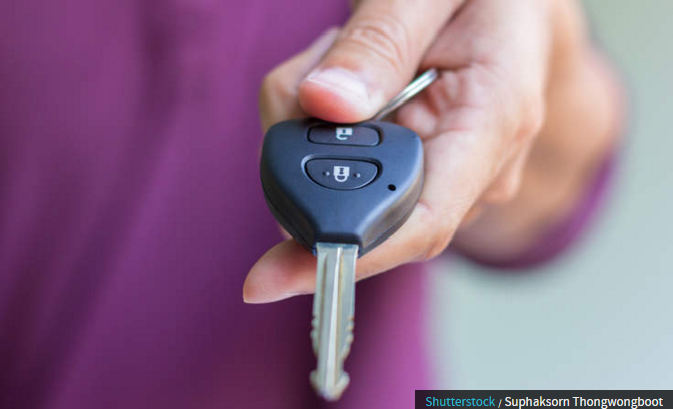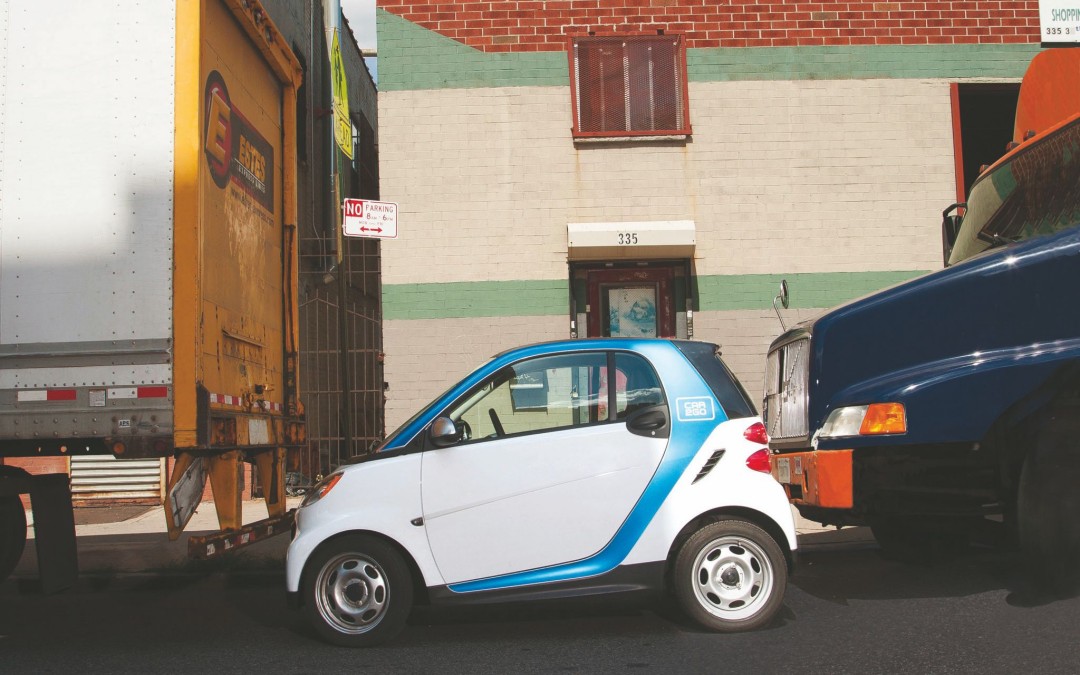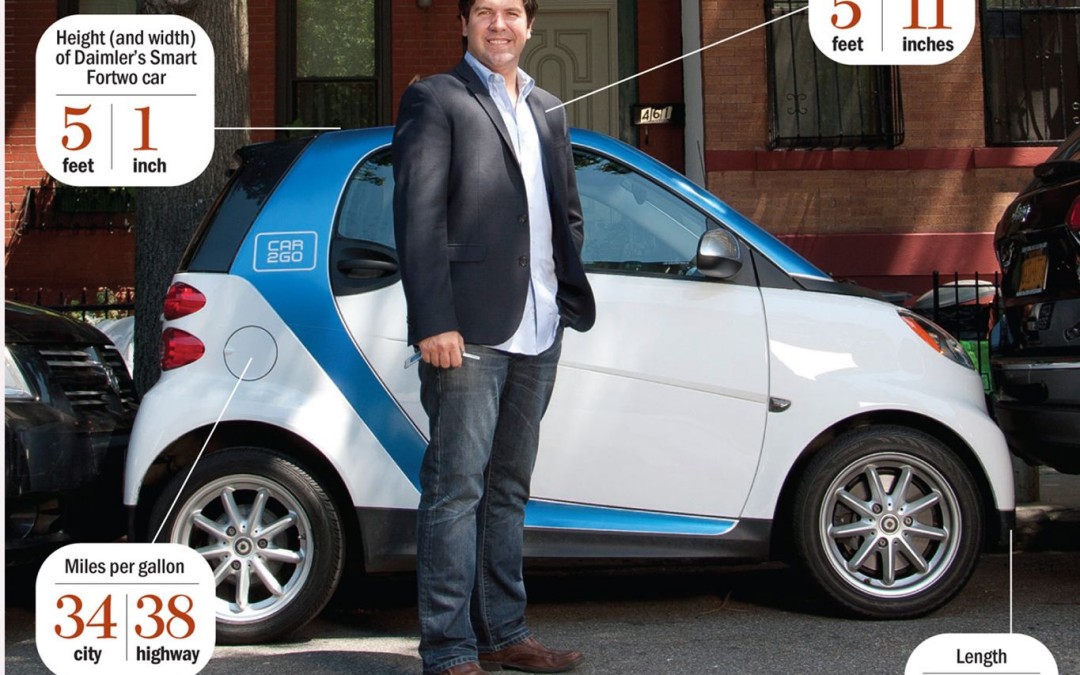
by Innovative Mobility Research | Oct 23, 2015 |
Lauren Hepler Wednesday, October 21, 2015 – 2:30am Owning a car in Manhattan has traditionally ranked pretty far up the list of pricey personal indulgences (that is, aside from opting to live in New York City in the first place). But with automakers looking to hang onto market share amid a surge in competition from shared car services, a new category of faux car ownership — on-demand shared cars located inside your own building — could change the economics of driving in busy urban areas. General Motors is one company pushing into this space through a deal with New York real estate firm Stonehenge Partners, where residents of the 479-unit Ritz Plaza apartment building can purchase access to a fleet of shared SUVs parked in their garage. To read the rest of the article, click...

by Innovative Mobility Research | Oct 5, 2015 |
Uber steers focus towards carpooling by Leslie Hook Uber started out with an upmarket limousine service, but the insurgent ride-hailing group has recently been moving in an altogether different direction: carpooling. “We are trying to induce the carpooling thing,” Travis Kalanick, chief executive, said earlier this month, pedalling his hands in front of him as if to illustrate people sharing a taxi. “That is exciting, that’s two cars becoming one.” The service has the potential to transform urban transportation, but only if the company and its rivals can make the algorithms work. Already in its home city of San Francisco, the UberPool service accounts for nearly half of journeys with Uber and is profitable one year after it was launched. Mr Kalanick was referring to shared-taxi services, the latest battleground between Uber and its rivals such as Lyft and China’s Didi Kuaidi. Lyft, which grew out of a start-up offering city-to-city ride-sharing, has its own such service, Line, that accounts for more than half of journeys taken with it in San Francisco. On the other side of the world, Hitch, Didi Kuaidi’s commuter carpooling service in China, is organising up to 700,000 trips a day, just three months after launch. For more details, click...

by Innovative Mobility Research | Aug 14, 2015 |
Car-sharing companies like Car2go and Zipcar may soon be getting some help parking their vehicles curbside, thanks to a City Council bill introduced Thursday. But it’s unclear whether local residents would be willing to give private companies special access to public parking spots. Car-share firms themselves may not even need the special treatment for their members to easily find street parking, they say. The bill, submitted by Councilman Mark Levine, would require the Department of Transportation to establish a program that would provide car-sharing businesses with dedicated parking spaces that would include metered spots as well as free spaces set aside for their cars. Companies would apply to be part of the program, and, if accepted, pay the city for metered parking, though not for spaces reserved for them elsewhere. Crain’s wrote about Car2go in a cover story in this week’s issue. Car2go is currently cooperating with transportation expert Susan Shaheen on a study that will see what effect its Smart cars have on private-car use and ownership—data that could prove helpful in winning over the Department of Transportation. Zipcar, whose model has been shown to reduce private-car use, also was unfamiliar with the bill. A spokeswoman said, however, that street parking has proved highly popular with members in cities where it’s permitted. To read more, click...

by Innovative Mobility Research | Aug 13, 2015 |
As residents of Brooklyn and Queens know all too well, not having a car makes it difficult to get from one borough to the other. Buses are maddeningly slow, most subway lines require a detour through Manhattan, and a cab or Uber quickly becomes expensive. “I have friends who live in Astoria I don’t see because it’s hard to get there,” said James Bednark, who works in television production and lives in Prospect Park South, Brooklyn, only 13 miles away. Soon, however, there will be another option: hopping into an unnervingly small, but surprisingly roomy, two-person vehicle and motoring to the other borough, where the rental ends once the driver parks. The move marks a critical step in the so-called sharing economy’s transportation segment, which once seemed a pipe dream of environmentalists and now includes such mainstays as Zipcar and Citi Bike. With its fleet of Smart cars that users can locate, reserve and open with a mobile app, Car2go could complement the transit system and help fill a hole in the way people get around. Or it could just bring more congestion to neighborhoods where it’s already hard to park. The most important data about Car2go may be coming this fall in a study by Susan Shaheen, a co-director of the Transportation Sustainability Research Center at the University of California, Berkeley. It will look at the company’s impact on five North American cities and whether its one-way model reduces car use and ownership and greenhouse-gas emissions, as Zipcar’s round-trip model has been shown to do. In the meantime, Ms. Shaheen said, Car2go has some advantages over others in...

by Innovative Mobility Research | Jul 31, 2015 |
By Donald Wood A new study has found that workers who use the Zipcar service are less likely to own a car than those who do not use the car sharing program. In a report from University of California, Berkeley’s Transportation Sustainability Research Center (TSRC), two in five corporate Zipcar members sell or avoid buying a vehicle after joining the car sharing service. Corporate members are classified as people who join a car sharing program through an affiliation with an employer. Overall, the study reports the use of Zipcars for work has helped decrease the need for at least 33,000 vehicles on the roads of North America. Of the people who abandoned car ownership, 41 percent take public transportation, 22 percent travel via bicycle and another 41 percent walk more often. Co-director of the TSRC at University of California, Berkeley, Susan Shaheen, Ph.D., released a statement about the study and the impact of Zipcar on the business world: “The business and corporate market for car sharing – until now – has not been well researched. Applying our team and research expertise to Zipcar’s raw data gives us the first look into how business car sharing members change behavior, and we found that this service yielded reduced car ownership and increased multi-modal behavior, particularly among corporate members that became zero-car households due to business car sharing.” To read more, click...






